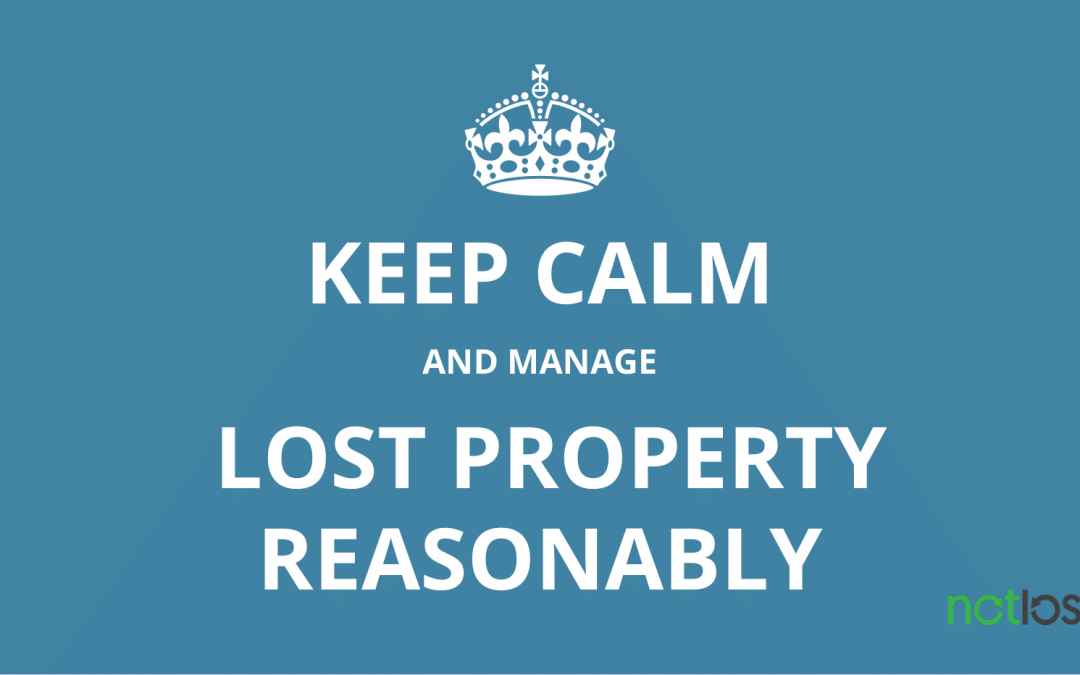Your organisation has a duty to handle lost property ‘reasonably’ – but what does that mean?
Lost property is a nuisance when you’re focused on ensuring your business runs smoothly, and as a result, is often forgotten (no pun intended). Items all too often end up on the desks of senior staff, stored in offices until they are claimed or eventually disposed of.
Although lost property seems like the customer’s problem, organisations have a legal obligation to look after it in a ‘reasonable’ manner. If you’re interested in the wider laws surrounding lost property, check out our Definitive guide to lost property laws in the UK.
But while you’re here let us explain how your organisation can manage lost property ‘reasonably’.
What is ‘reasonable’ lost property management?
Reasonable refers to many aspects of lost property management, including the length of time lost items are stored for.
The Oxford Dictionary defines reasonable as: “fair, practical and sensible”. These are three subjective words, however we can easily relate them to lost property management.

Be Fair.
Firstly, give your visitors enough time to contact you and ask for their item back. Most enquiries come within a week or two of items being lost, however this is dependent on the organisation, venue or event.
Be Practical.
Secondly, don’t fill your office with ancient lost property. The likelihood of it being claimed a year after it was lost is very small!
Be Sensible.
Lastly, certain items such as food or drink will clearly have their own ‘expiry’ date. Don’t feel obliged to keep these items around longer than necessary.
Reasonable storage times might be different depending on the lost property
When managing lost property, you will realise the variety of items found. Each misplaced possession comes with its own monetary and sentimental price tag. Therefore, you will need to assess each one individually and if you’re being ‘reasonable’, will keep some longer than others.
However, to simplify everything, let’s group them into commonly lost items.
– Data-Sensitive Items
– Low Value Items
– High Value Items
– Perishables
Data-sensitive items of lost property
Credit cards, ID cards, passports and medications are commonly misplaced and are perfect examples of data-sensitive items.
Such posessions must be handled in a GDPR-compliant fashion. Organisations should keep these items for a limited amount of time – generally between 1-3 days until they can be disposed of correctly.
Read our blog to ensure a GDPR-compliant lost property procedure.
Low value items of lost property
Clothing, books and umbrellas (lost property’s public enemy number one) are low-value, easily forgotten items.
Many of these will have no monetary or sentimental value, and guests are unlikely to spend time finding them. Therefore, look after these items for a decent length of time, generally between 2 and 4 weeks, to allow your customers to retrieve them, but don’t fill up your office space with them.

Source: BBC News
High value items of lost property
Electronics, watches, and fine jewellery are high-value items. Store them safely and for a longer period of time.
Your customers are likely to inquire about these items, with the majority of items generally claimed within 2-4 weeks of being lost.
Due to their value, many organisations hold onto these items for 3-6 months.
Perishables
We advise food and drink is disposed of immediately or by the end of the day. Realistically, no one’s going to come and claim a half-eaten sandwich
State your organisations’ lost property procedure
It is beneficial for an organisation to state its policies. What might seem reasonable to you might not seem so to your customers, especially during an already distressing time.
State your lost property procedure and clearly show your customers that all lost items are treated fairly, practically, and sensibley.

Can NotLost help us to store lost items for a ‘reasonable’ length of time?
Although it seems logical to dispose of lost items after a ‘reasonable’ length of time, it can be confusing to know when this is, especially if there is no structured system in place.
The NotLost platform easily shows you what items are ‘active’ or ‘expired’ – ensuring items are stored for a reasonable length of time before they are discarded and minimising the chances of disposing of items too quickly.
How to be ‘reasonable’ when disposing of lost property?
Now you’re an expert on storing lost property reasonably. However, you will probably also want to know how to dispose items once the inevitable ‘expiration’ date comes.
At NotLost, we do our best to be environmentally friendly by supporting ethical disposal routes and ‘zero to landfill’. If you’d like to learn more about how to do the same, read our handy guide on how to dispose of lost items in a responsible manner.

In conclusion
Lost property can be a nuisance—especially when you need to handle it reasonably but don’t understand what that means! However, with a reliable system and our handy guidelines, it needn’t be an issue.
Find out more about how to manage your lost property with a transformational lost and found software solution. Explore our Features page. Plus, follow us on LinkedIn and Twitter to stay up to date with all things lost property!
